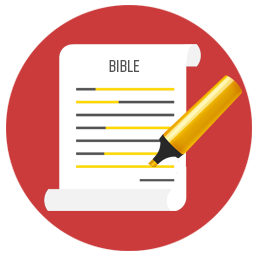This Bible study is based on Bible Readings for the Home, a topical study presented in a question-and-answer format. The scripture references come from both the KJV and NIV translations. Additionally, we’ve provided links to each verse from the World English Bible for a more modern interpretation. We encourage you to follow along in your own Bible, reflect on the guided questions, and highlight the verses that speak to you. Feel free to share this study with your friends and family. Enjoy the journey!
16
For God so loved the world, that he gave his one and only Son, that whoever believes in him should not perish, but have eternal life.
World English Bible
7 He, in the days of his flesh, having offered up prayers and petitions with strong crying and tears to him who was able to save him from death, and having been heard for his godly fear,
8 though he was a Son, yet learned obedience by the things which he suffered.
9 Having been made perfect, he became to all of those who obey him the author of eternal salvation,
World English Bible
7 For one will hardly die for a righteous man. Yet perhaps for a righteous person someone would even dare to die.
8 But God commends his own love toward us, in that while we were yet sinners, Christ died for us.
World English Bible
3 Yahweh appeared of old to me, saying,
“Yes, I have loved you with an everlasting love.
Therefore I have drawn you with loving kindness.
World English Bible
27 He answered, “You shall love the Lord your God with all your heart, with all your soul, with all your strength, and with all your mind; and your neighbor as yourself.”
World English Bible
5 You shall love Yahweh your God with all your heart, with all your soul, and with all your might.
World English Bible
3 For this is loving God, that we keep his commandments. His commandments are not grievous.
World English Bible
17 The Spirit and the bride say, “Come!” He who hears, let him say, “Come!” He who is thirsty, let him come. He who desires, let him take the water of life freely.
World English Bible
15 If it seems evil to you to serve Yahweh, choose today whom you will serve; whether the gods which your fathers served that were beyond the River, or the gods of the Amorites, in whose land you dwell; but as for me and my house, we will serve Yahweh.”
World English Bible
18 Oh that you had listened to my commandments!
Then your peace would have been like a river,
and your righteousness like the waves of the sea.
World English Bible
19 If you are willing and obedient,
you shall eat the good of the land;
20 but if you refuse and rebel, you shall be devoured with the sword;
for the mouth of Yahweh has spoken it.”
World English Bible
10
If you keep my commandments, you will remain in my love; even as I have kept my Father’s commandments, and remain in his love.
World English Bible
15 “When Aaron and his sons have finished covering the sanctuary, and all the furniture of the sanctuary, as the camp moves forward; after that, the sons of Kohath shall come to carry it: but they shall not touch the sanctuary, lest they die. These things are the burden of the sons of Kohath in the Tent of Meeting.
World English Bible
3 They set God’s ark on a new cart, and brought it out of Abinadab’s house that was on the hill; and Uzzah and Ahio, the sons of Abinadab, drove the new cart.
World English Bible
9 But to the sons of Kohath he gave none, because the service of the sanctuary belonged to them; they carried it on their shoulders.
World English Bible
15 The children of the Levites bore God’s ark on their shoulders with its poles, as Moses commanded according to Yahweh’s word.
World English Bible
11 Because sentence against an evil work is not executed speedily, therefore the heart of the sons of men is fully set in them to do evil.
World English Bible
6 When they came to the threshing floor of Nacon, Uzzah reached for God’s ark, and took hold of it; for the cattle stumbled.
World English Bible
7 Yahweh’s anger burned against Uzzah; and God struck him there for his error; and he died there by God’s ark.
World English Bible
26 Samuel said to Saul, “I will not return with you; for you have rejected Yahweh’s word, and Yahweh has rejected you from being king over Israel.”
World English Bible
17 It came to pass, when they had taken them out, that he said, “Escape for your life! Don’t look behind you, and don’t stay anywhere in the plain. Escape to the mountains, lest you be consumed!”
World English Bible
26 But his wife looked back from behind him, and she became a pillar of salt.
World English Bible
32
Remember Lot’s wife!
World English Bible
2 For if the word spoken through angels proved steadfast, and every transgression and disobedience received a just recompense;
3 how will we escape if we neglect so great a salvation—which at the first having been spoken through the Lord, was confirmed to us by those who heard;
World English Bible
26 For if we sin willfully after we have received the knowledge of the truth, there remains no more a sacrifice for sins,
World English Bible
9
And in vain do they worship me,
teaching as doctrine rules made by men.’”
World English Bible
